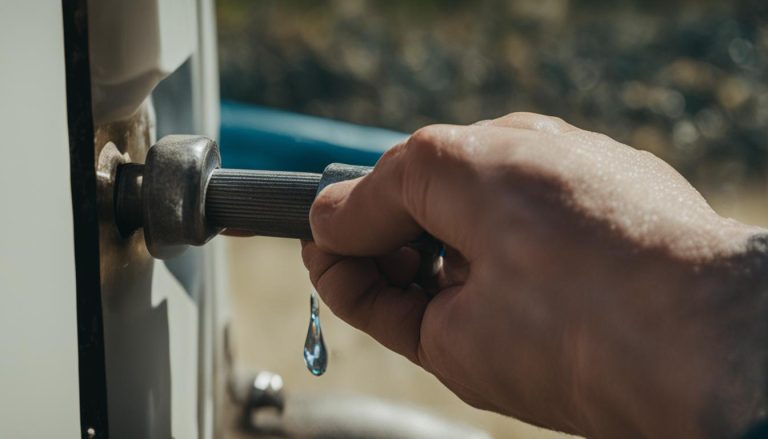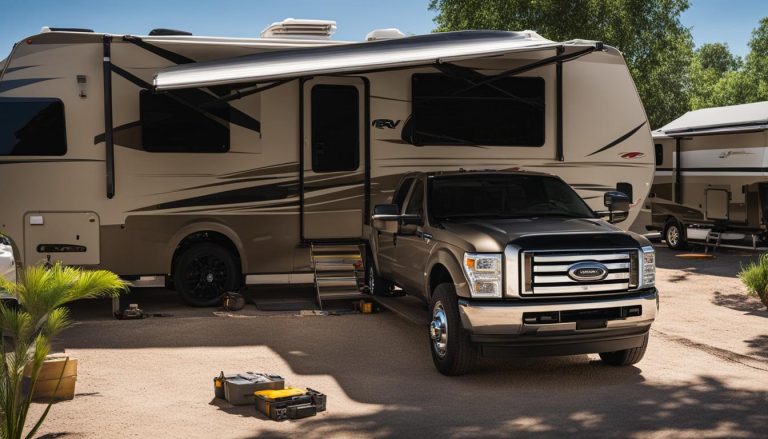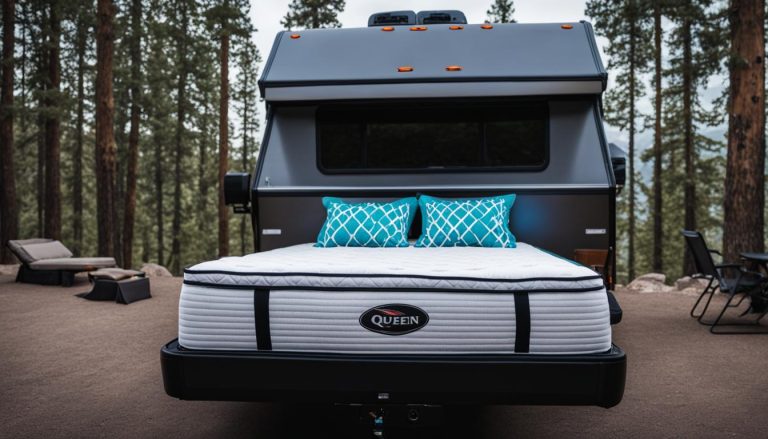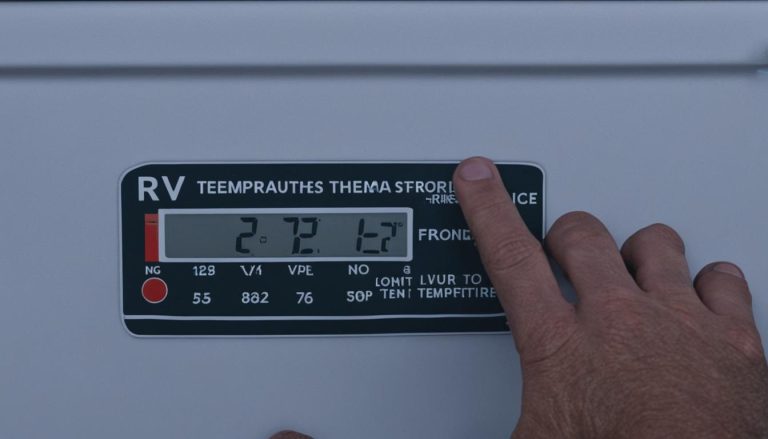Fresh Water Tank Care: Clean Your RV With Ease
gorvlifestyle.com and its partners may earn a commission if you purchase a product through one of our links
Cleaning your RV’s fresh water tank is an essential part of maintenance to ensure safe and refreshing water while on your travels. Regular cleaning helps eliminate bacteria, mold, and mildew that can grow in the tank and water lines. In this article, we will discuss why it’s important to sanitize your RV fresh water tank, when to do it, and how to properly clean it.
Key Takeaways:
- Regularly cleaning your RV’s fresh water tank prevents the growth of bacteria, mold, and mildew.
- Sanitizing your RV fresh water tank ensures safe and refreshing water for your travels.
- Sanitize your RV fresh water tank every six months or sooner if you notice an odd taste or smell in the water.
- Using Clear2O’s TankFRESH provides a safe and effective alternative to bleach for sanitizing your RV water tank.
- Follow the recommended steps to properly clean and sanitize your RV’s fresh water tank.
Why Sanitize Your RV Fresh Water Tank?
Sanitizing your RV fresh water tank is essential for maintaining the cleanliness and safety of your water supply. When filling up your tank, you can never be sure of the quality of the water source. It may contain impurities, bacteria, or other contaminants that can affect your health. By regularly sanitizing your tank, you eliminate these potential threats and ensure that your family has access to clean and healthy water during your travels.
Over time, if water sits in the tank for extended periods, it creates an environment conducive to the growth of bacteria, mold, and mildew. These microorganisms can multiply rapidly, posing health risks and leading to foul odors and tastes in the water. Regular sanitization prevents the buildup of harmful substances and keeps your water system in optimal condition.
Moreover, sanitizing your RV fresh water tank is crucial for the longevity and performance of the tank itself. By removing any accumulated sediment, debris, and contaminants, you help maintain the tank’s structural integrity and prevent clogs or damage to the water lines and fixtures.
So, whether you’re planning a weekend getaway or an extended road trip, taking the time to sanitize your RV fresh water tank is a must. It ensures a safe and enjoyable experience for you and your loved ones.
| Benefits of Sanitizing Your RV Fresh Water Tank |
|---|
| 1. Ensures clean and safe water for your family |
| 2. Eliminates bacteria, mold, and mildew |
| 3. Prevents foul odors and tastes in the water |
| 4. Maintains the longevity and performance of the water tank |
When to Sanitize RV Fresh Water Tank Systems
Regularly sanitizing your RV fresh water tank is essential to maintain clean and safe water for your travels. It is recommended to sanitize your tank every six months or sooner if certain conditions arise. By following these rv water tank cleaning tips, you can ensure that your water remains fresh and free from any potential contaminants.
- If you notice an odd taste or smell in the water, it’s time to sanitize your tank.
- If your RV’s fresh water tank has been in storage for an extended period, it’s crucial to sanitize it before use.
- If you suspect that the water used to fill your tank was not clean, sanitization is necessary.
By adhering to a regular sanitization schedule, you can enjoy clean and refreshing water throughout your RV adventures.
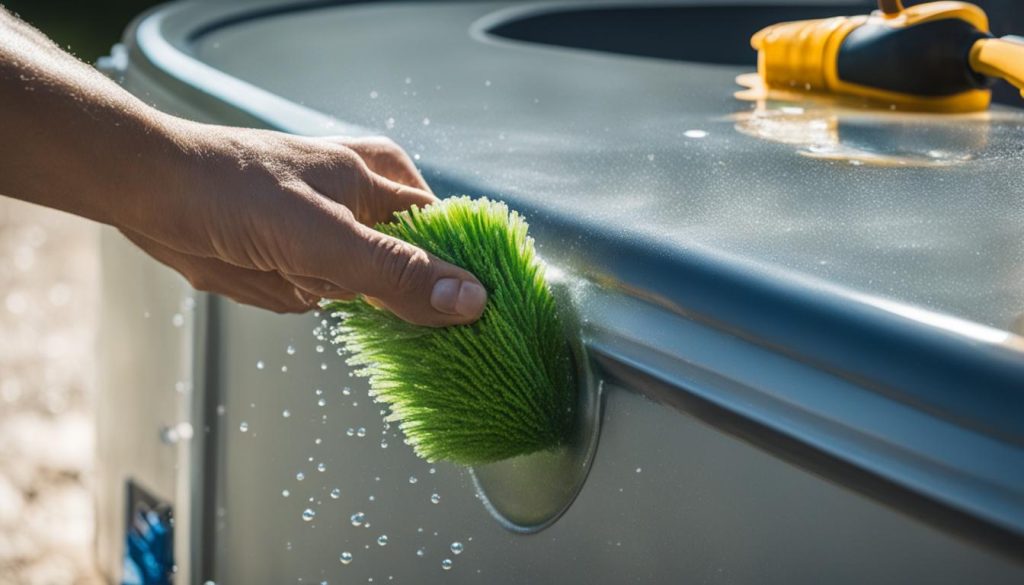
What You Need to Sanitize Your RV Fresh Water Tank and System
When it comes to cleaning your RV’s fresh water tank, you don’t need a long list of supplies. In fact, the items you need are simple and easily accessible. Here’s what you’ll need:
- Regular bleach: Choose a well-known brand that is safe to use in drinking water systems.
- A funnel: This will help you pour the bleach into the tank without making a mess.
- A clean water source: You’ll need access to fresh water to fill and flush your tank.
It’s important to use the correct ratio of bleach to water for effective sanitization. The exact measurements will depend on the size of your fresh water tank. As a general guideline, you should use a ¼ cup of bleach for every 15 gallons of water in your tank. Make sure to refer to the manufacturer’s instructions for your specific tank.
Having these supplies on hand will ensure that you’re ready to clean and sanitize your RV’s fresh water tank whenever necessary, keeping your water clean, safe, and refreshing for your next adventure.
| Supplies | Quantity |
|---|---|
| Regular bleach | As directed by manufacturer, generally 1/4 cup per 15 gallons of water |
| A funnel | 1 |
| Clean water source | As needed |
How to Sanitize Your RV Fresh Water Tank
Properly sanitizing your RV’s fresh water tank is crucial for ensuring clean and safe water while on your travels. Follow these steps to effectively clean your RV water tank and maintain its longevity.
- Step 1: Turn off the water heater and pump
- Step 2: Bypass the water heater and filter
- Step 3: Drain the entire fresh water system
- Step 4: Create a bleach mixture
- Step 5: Fill the tank with fresh water
- Step 6: Turn on the pump and open all faucets
- Step 7: Let the mixture sit for 24 hours
- Step 8: Drain the system and refill with fresh water
- Step 9: Flush until the smell of bleach is gone
- Step 10: Replace the water heater plug
Before beginning the sanitization process, make sure to turn off your RV’s water heater and pump to avoid any damage.
To prevent the bleach mixture from entering the water heater and filter, bypass them by following your RV’s manufacturer instructions.
Open all the faucets, including the showerhead, and let the water entirely drain from the fresh water system.
Mix a solution of ¼ cup of bleach for every 15 gallons of water in your fresh water tank. Use a funnel to add the bleach mixture into the tank.
Fill the fresh water tank with clear and clean water until it is nearly full. This allows the bleach mixture to properly circulate through the system.
Turn on the water pump and open all the faucets, including the showerhead, to ensure the bleach mixture is distributed throughout the entire system.
Allow the bleach mixture to sit in the system for at least 24 hours. This gives the bleach enough time to kill any bacteria, mold, or mildew present in the tank and water lines.
Drain the entire system, including the tank and all the faucets, to remove the bleach mixture. Close the low-point drain valves and refill the fresh water tank with clean and clear water.
Run all the faucets, including the showerhead, until there is no smell of bleach. This ensures that all traces of the bleach mixture are completely flushed out.
Finally, replace the water heater plug that was removed during the process and ensure it is tightly secured.
By following these steps on how to sanitize your RV fresh water tank, you can maintain a clean and safe water supply during your travels. Regular cleaning and sanitization are essential for a worry-free RVing experience.
Comparison of Bleach and Clear2O’s TankFRESH
| Bleach | Clear2O’s TankFRESH | |
|---|---|---|
| Effectiveness | Effective at sanitizing the fresh water tank and water lines | Safe and effective alternative to bleach |
| Scent | May leave a residual smell in the water system | Eliminates odors and deodorizes the entire water system |
| Corrosion | May corrode metal parts of the system | Non-corrosive formula |
| Safety | Potentially harmful if ingested | Chlorine-free and safe to use |
| Environmental Impact | Can have a negative impact if not disposed of properly | Biodegradable and environmentally friendly |
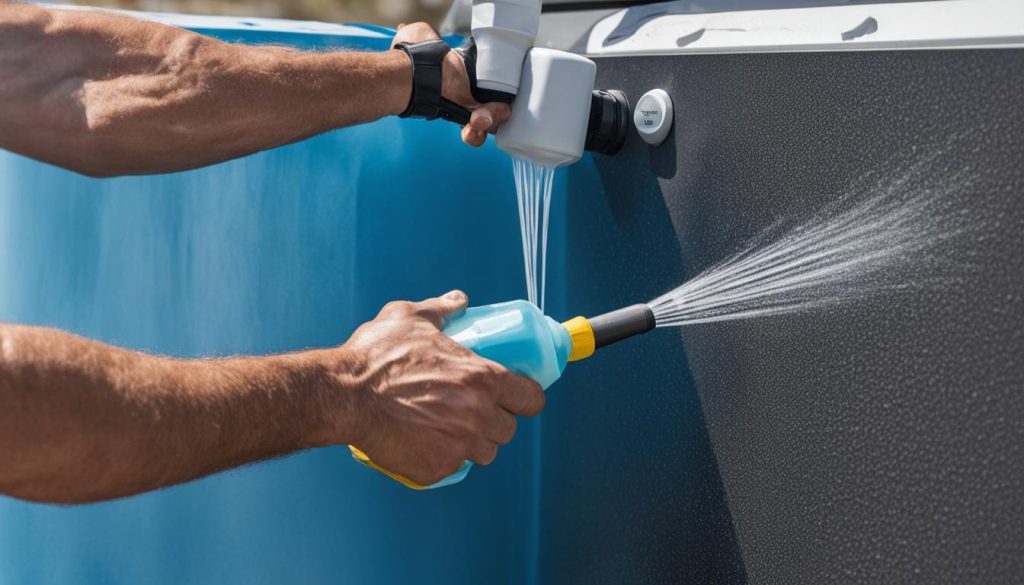
Clear2O’s TankFRESH Is A Safe & Effective Alternative To Bleach
If you’re looking for a safe and effective alternative to bleach for maintaining your RV’s water tank, Clear2O’s TankFRESH is the answer. TankFRESH is specifically designed to clean and deodorize your RV’s fresh water tank, water supply lines, and fixtures, ensuring that you have clean and fresh water every time you turn on the faucet. Unlike bleach, TankFRESH is chlorine-free, biodegradable, and easy to use.
TankFRESH offers a convenient and hassle-free way to keep your RV’s water system in optimal condition. It eliminates bacteria, mold, and mildew that can accumulate in the tank and water lines, providing you with safe and great-tasting water throughout your travels. With TankFRESH, you can have peace of mind knowing that your RV’s water tank is well-maintained and your family’s health is protected.
To use TankFRESH, simply follow the instructions provided on the package. It’s a straightforward process that ensures the product is used correctly for maximum effectiveness. TankFRESH is a reliable solution that delivers excellent results, making it the best way to clean your RV water tank.
| Benefits of TankFRESH | Drawbacks of Bleach |
|---|---|
| TankFRESH cleans and deodorizes your fresh water tank, water supply lines, and fixtures. | Bleach can leave a residual smell and taste in the water system if not properly rinsed. |
| TankFRESH is chlorine-free, biodegradable, and eco-friendly. | Bleach can corrode metal parts of the system and degrade rubber or plastic components. |
| TankFRESH is easy to use and provides hassle-free maintenance. | Bleach, in high concentrations, can be harmful if ingested and negatively impact the environment. |
With the numerous benefits it offers, TankFRESH is the ideal choice for RV water tank maintenance. Say goodbye to the drawbacks of bleach and switch to the safer and more effective alternative – Clear2O’s TankFRESH.
How to Use TankFRESH Water Tank & System Flush
Cleaning your RV’s water tank and system is essential for maintaining clean and safe water during your travels. TankFRESH offers an easy and effective solution for sanitizing your RV’s fresh water tank. Here is how you can use TankFRESH to ensure a clean RV water tank:
- Step 1: Fill the Fresh Water Tank
- Step 2: Add TankFRESH Solution
- Step 3: Slosh the Mixture
- Step 4: Run the Faucets
- Step 5: Let it Sit
- Step 6: Repeat the Process
- Step 7: Drain and Fill
Fill your RV fresh water tank halfway with clean, fresh water.
Add the recommended amount of TankFRESH solution to the fresh water tank. The precise measurements will vary depending on the size of your tank, so refer to the product instructions for the correct dosage.
Move your RV back and forth, allowing the TankFRESH solution to slosh around and mix thoroughly with the water.
Turn on the water pump and run every faucet and showerhead in your RV. This ensures that the TankFRESH solution is circulated throughout the entire water system, including the pipes and fixtures.
Allow the TankFRESH solution to sit in the system for about 30 minutes. This contact time helps effectively clean and sanitize the water tank and system.
After the initial 30 minutes, repeat the process of running the faucets and letting the TankFRESH solution sit in the system for another 30 minutes. This ensures thorough cleaning and disinfection.
Drain the remaining water from the fresh water tank and refill it with clean, fresh water. Run each faucet and showerhead again to ensure all traces of the sanitizing mixture are gone.
Using TankFRESH is a convenient and effective way to clean your RV water tank, removing any bacteria, mold, or mildew that may be present. By following these simple steps, you can keep your RV’s water system clean, fresh, and ready for your next adventure.
Why bleach is bad for sanitizing your RV fresh water tank
While bleach can be used to sanitize an RV fresh water tank, it may not be the best option due to several drawbacks. One major downside of using bleach is that it can leave a residual smell and taste in the water system if not properly rinsed. This can be quite unpleasant and can affect your overall RV water experience.
Another drawback of bleach is that it can corrode metal parts of the RV water system, such as pipes and connectors. This corrosion can lead to leaks or other issues that require costly repairs. Additionally, bleach can degrade rubber or plastic components like seals and gaskets, reducing their effectiveness and longevity.
Furthermore, using high concentrations of bleach can be harmful if accidentally ingested and can have a negative impact on the environment if not disposed of properly. This is because bleach contains chemicals that can be toxic and can harm aquatic life when released into water sources. It’s important to consider the potential environmental consequences when choosing a cleaning solution for your RV water tank.
For a more effective and safer alternative to bleach, consider using Clear2O’s TankFRESH. This product offers a chlorine-free and biodegradable solution to sanitize your RV fresh water tank. TankFRESH effectively cleans and deodorizes your water tank, water supply lines, and fixtures without leaving any residual smell or taste. It is easy to use and provides a convenient way to keep your RV’s water system clean and fresh, ensuring a safer and more enjoyable water experience during your travels.
FAQ
How often should I sanitize my RV fresh water tank?
It is recommended to sanitize your RV fresh water tank every six months or sooner if you notice an odd taste or smell in the water, if the tank has been in storage for an extended period, or if you suspect that the water used to fill the tank was not clean.
What supplies do I need to sanitize my RV fresh water tank?
To sanitize your RV fresh water tank, you will need regular bleach, a funnel, and a clean water source. The exact measurements of bleach and water will depend on the size of your tank. It is recommended to have a ¼ cup of bleach for every 15 gallons of water in your tank.
How do I sanitize my RV fresh water tank?
The process of sanitizing your RV fresh water tank involves several steps. First, you need to turn off the water heater and pump. Then, you bypass the water heater and filter and drain the entire fresh water system. Next, you create a bleach mixture and add it to the tank, followed by filling the tank with fresh water. After 24 hours, you drain the system, close the low-point drain valves, and refill the tank with fresh water. Finally, you run the faucets until the smell of bleach is gone and replace the water heater plug.
Is there an alternative to bleach for sanitizing my RV fresh water tank?
Yes, Clear2O offers a product called TankFRESH, which is a safe and effective alternative to bleach. TankFRESH cleans and deodorizes your fresh water tank, water supply lines, and fixtures. It is chlorine-free, biodegradable, and easy to use.
How do I use Clear2O’s TankFRESH Water Tank & System Flush?
To use Clear2O’s TankFRESH Water Tank & System Flush, you simply fill your RV fresh water tank halfway with fresh water, then add the recommended amount of TankFRESH solution. After sloshing the mixture around by moving your RV back and forth, turn on the water pump and run every faucet and showerhead to ensure the mixture is circulated throughout the system. Let it sit for about 30 minutes and then repeat the process. Finally, drain the remaining water from the tank and fill it with fresh water, running each faucet to ensure all traces of the sanitizing mixture are gone.
Why is bleach bad for sanitizing my RV fresh water tank?
Bleach can leave a residual smell and taste in the water system if not properly rinsed. It can also corrode metal parts of the system and degrade rubber or plastic components such as seals and gaskets. In high concentrations, bleach can be harmful if ingested and can have a negative impact on the environment when not disposed of properly.


